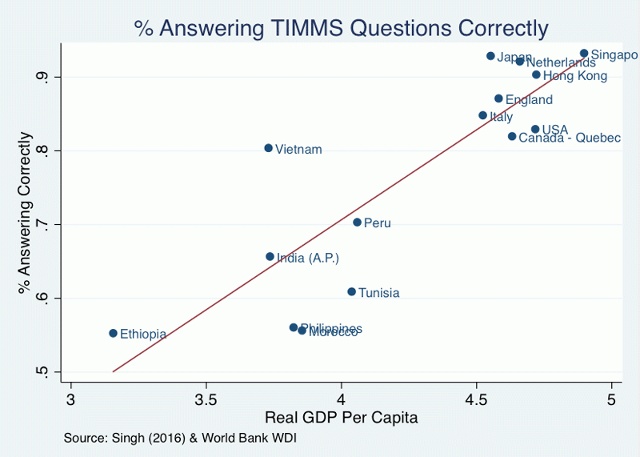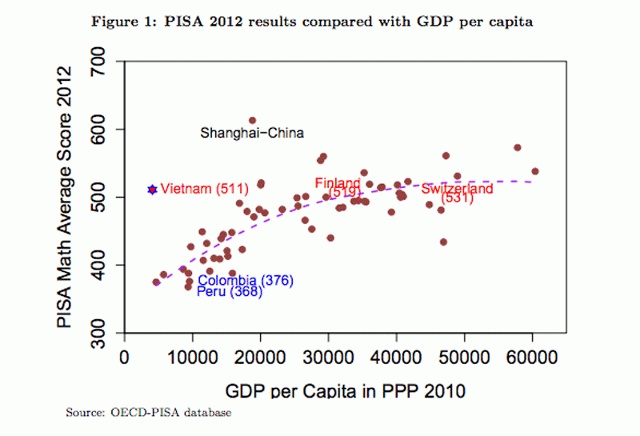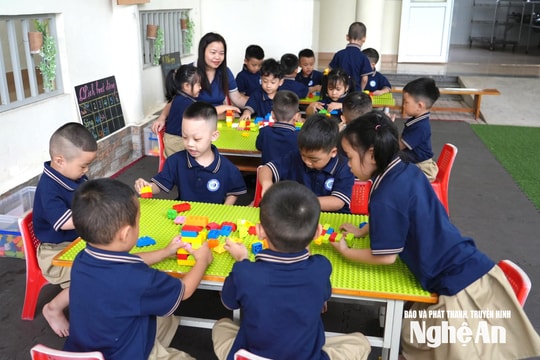Foreign newspapers explain the high achievements of Vietnamese education
Based on a survey by researchers, Business Insider has just published an article explaining the reasons why Vietnamese students achieve high results in international exams.
Vietnam is considered the world’s biggest education outlier. It is essentially the only low-income country that performs at the same level as developed countries on international academic tests.
Normally, a country’s economic strength will influence how its students perform on major exams. However, with a GDP per capita only a fraction of the US, Vietnam can produce surprising results that many experts cannot explain.
Researchers looked at two major international exams to understand the “Vietnam impression”. One of them is TIMMS. In this exam, Vietnamese students performed better than those in countries with similar GDP per capita.
 |
| Data from TIMMS. |
In 2014, researcher Abhijeet Singh at University College London published his study on TIMMS and found that Vietnamese education creates early superiority. At age 5, Vietnamese children only outperform students in other developing countries. As age increases, the gap widens.
In his research paper on Improving Education Systems, education expert Lee Crawfurd stated, "a year of primary school in Vietnam is much more effective than a year of primary school in Peru or India in terms of skills acquisition."
"Based on the Vietnam phenomenon, this study addresses the question 'Why do large annual differences in educational performance exist between different countries?' Simply put, why is education in some countries better?", he wrote.
Currently, two researchers, Suhas D. Parandekar and Elisabeth K. Sedmik of the World Bank (WB), also conducted a survey of the results of the Program for International Student Assessment (PISA) from 2012 onwards to explain this issue.
Among the eight developing countries participating in the program, Vietnam has the lowest GDP per capita, 4,098 USD, but achieved the highest results.
 |
| PISA 2012 results and GDP per capita of countries. |
Vietnamese students' scores surprised many people, even being comparable to countries with top quality education such as Finland, Switzerland and far superior to Colombia and Peru.
Vietnam's math score is 128 points higher than the average score of the remaining low-income countries. This means that Vietnam's education quality is 3 years ahead of the other 7 countries.
Two World Bank researchers used PISA data, including issues about students' living conditions, learning experiences, and school systems, to understand the factors that make Vietnamese education more effective than economic circumstances. They found that education investment and cultural differences account for 50% of the difference.
Cultural differences make students in each country have their own characteristics. In general, Vietnamese children focus on studying and doing homework very seriously. They rarely come to school late or skip school without permission.
Outside of school hours, Vietnamese students spend 3 hours more per week studying than students in other developed countries. They also do not appear to be overly anxious about Math and are quite confident about their ability to apply this subject in the future.
In addition, parents are often concerned about their children's education. In terms of structure, education is highly centralized. Teachers are not in charge of themselves, their activities are supervised by others. Education also emphasizes the achievement factor more.
More importantly, despite its low GDP, Vietnam invests more in education than other low-income countries. Compared to the seven developing countries participating in PISA, Vietnam has a lower level of economic development, a higher rate of illiteracy among parents, and a lower number of schools in urban areas than in rural areas. These are generally unfavorable factors for education.
However, despite its economic difficulties, Vietnam’s education infrastructure and resources are better than the other seven countries. Schools do not have many computers but are often connected to the Internet. Researchers see this as evidence that Vietnam focuses on investing in education.
The government also creates conditions for children to go to school. Compared to other countries, kindergarten in Vietnam is easier.
Of course, these factors only account for 50%. The other half remains a mystery to scientists.
According to Zing.vn

.jpg)


.jpg)

.jpg)

